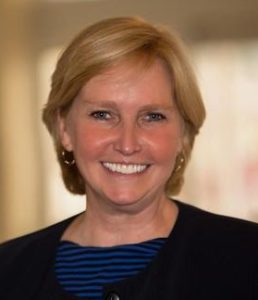Susan Beaumont looks like a prescient genius right now. She wants you to know the actual situation is slightly different.
One year ago this month, her latest book was published with the title How to Lead When You Don’t Know Where You’re Going. She had no way of understanding that six months later, that title would resound with every pastor in America facing altered life amid a global pandemic.

Susan Beaumont
Beaumont is a consultant, coach and spiritual director who has worked with hundreds of congregations and denominational bodies across the United States and Canada. She previously served nine years as a senior consultant with the Alban Institute.
About the book’s origin
“The book really began five years ago,” she explained. “I was growing more disgruntled in my own practice because I was seeing a bifurcation around the spirituality of the church and the leadership of the organization. I saw that divide growing wider and deeper.”
More plainly: “Churches in crisis were leaning into organizational tactics, not spiritual practice. I had a sense of malaise about that.”
Her response was to enroll in a two-year program to study spiritual direction. Now, in addition to her MBA from Northwestern University and master of divinity degree from McCormick Theological Seminary, she also is a graduate of the Shalem Institute in Spiritual Formation.
About halfway through that spiritual direction training, she found her own new sense of calling. That calling, in turn, led to the new book.
While most people get certified as spiritual directors to work with individuals one-on-one, Beaumont realized she could apply the same principles for entire congregations. “This real calling began to emerge to me, toward this notion of no you’re not here to be a spiritual director to a pastor but to be a spiritual director to the organization.”
And then she began to read an author who opened a new chapter in her own understanding of how to give better spiritual direction — not just organizational direction — to churches. Victor Turner’s work in “liminality” was the key.
“Liminal” means “a threshold” or a kind of ambiguity or disorientation that occurs in important periods of life passage.
Living in liminal spaces
In certain academic circles, “liminal space” and “liminality” are descriptive words to banter about. But Beaumont understood the average church leader, and even the average pastor, would not know that word or be drawn in by it. However, she knew the concept could be a game-changer for pastors and churches stuck in what multiple other authors — most notably Phyllis Tickle in her seminal book Great Emergence — have described as an in-between time for the church.
“The church is stuck in the in-between,” Beaumont said. “The way of being church that has thrived is over. The new way of church is not yet clear. We don’t really know yet what our new order is that’s going to lead to the new level of thriving. That’s a liminal space.”
 If she could get beyond the big, unknown word, she found pastors “were really resonating with this,” she explained. A student in one of her classes thought about that problem and then said: “This is a book about how to lead when you don’t know where you’re going.” Thus, the title was born.
If she could get beyond the big, unknown word, she found pastors “were really resonating with this,” she explained. A student in one of her classes thought about that problem and then said: “This is a book about how to lead when you don’t know where you’re going.” Thus, the title was born.
Enter COVID-19
Then the pandemic hit full force in March, followed by the racial reckoning across America and one of the most consequential presidential elections in history. In this season, “everybody began having this sense of liminality,” Beaumont said. “The pandemic immediately put us in this place where we all got it. Every day you have to lead people even though you have no clue.”
If she was prescient in that, it was the work of the Holy Spirit, she believes. Writing this book “really did feel like a calling.”
The calling changed her for good. “What I had done is meld together the skills of spiritual direction with leadership coaching. My leadership coaching comes from a different place than before. I now enter organizations with a deep respect for soulfulness; congregations are at their healthiest when the soul of the leader is in tune with the soul of the organization.”
That means no more “canned program stuff,” she said, because church programming is too often “disconnected from soulfulness.”
The consultant with the MBA now sees the future of the church more in spiritual practices than in organizational charts.
Spiritual practices and discernment
“One thing I’m finding is how disconnected we Christians are from our own historical practices of discernment,” she said. “People throw that word around all the time. Culturally, what it has come to mean is we are going to use good, rational discourse and take our time about it. And maybe throw prayer in on the side.”
Her call now to perhaps begin with an ancient prayer practice rather than a survey “makes people uncomfortable,” she acknowledged. “They think it’s a New Age thing. I have to explain that it’s an ancient Christian practice.”
What’s needed for an in-between time for the church — whether pre-pandemic or mid-pandemic — is a different kind of leadership than most pastors and most churches are accustomed to.
“We have to move out of the striving mode — working harder and faster — into a surrendering stance.”
“The traditional teaching about good leadership is all about providing order and solutions and control,” she said. “When in fact that is not the kind of leadership that serves us well in liminality.
“The kind of leadership we need is rooted in unknowing, being untrusting about our own expertise. We have to move out of the striving mode — working harder and faster — into a surrendering stance. That’s not about giving up. I’m talking about the kind of leaning-in yielding. I can’t change the situation, so what can I learn from the situation?”
Adaptive leadership
For several decades now, churches have been coached to manage change by identifying where they are today, where they need to be tomorrow, and what steps will be necessary to get from here to there. This is the bread-and-butter of most church strategic planning.
“The thing that’s different about liminality is we don’t know where we are and we don’t know where we’re going,” Beaumont explained.
Her favorite example of the kind of adaptive leadership needed right now is from a pastor friend who has told the congregation about coronavirus: “We’re going to be back in the building on this date — unless we’re not.”
The big problem with living in a liminal space is that while you “don’t know where you are or where you’re going, yet you still have to lead.”
The big problem with living in a liminal space is that while you “don’t know where you are or where you’re going, yet you still have to lead.”
The way through such a time as this is not a traditional strategic plan, Beaumont advised.
Four big ideas for leaders
She highlights four big ideas for church leaders in this moment:
Deepen capacity for group discernment. “Break out of the mode of using Robert’s Rules of Order” to make orderly and rational decisions and instead take time for spiritual discernment, she said.
Tend to institutional memory. “This is deeply sacred work right now,” she explained. “Aristotle said memory is where the soul resides.” For churches, this work must include not only reviewing key institutional stories for transcendent values but evaluating them for truth. “Many of the ways we’re telling our stories are not serving us well right now.”
Discover purpose. “We look at the stories to get the meaning of where we’ve been, but we have to move from that to where we’re going,” she said. “Most congregations have a scattershot sense of purpose and broad mission statements. A season like this requires focusing in on what we need to do.”
Engage emergence. “As the chaos begins to resolve itself, there’s a predictable pattern in which that happens. Out of that comes the experimentation and the creativity and the coherence into something new,” Beaumont explained. “The challenge for us as leaders is you cannot lead emergence. But you can adopt behaviors that support it. There are also things you can do that will stop the process. Right now, you can’t plan your way out of this. What we need to do is learn how to experiment and fail.” And a corollary is that churches often see they have declining resources and become afraid to use those resources to try anything new.
Innovation and anxiety
Herein lies a possible positive outcome from this age of church uncertainty, she continued. “The nature of liminal seasons is that they are ripe for creativity and innovation — but they are dangerous. Anxiety is high. Most people right now are so distracted by the noise of anxiety that they can’t figure out what to pay attention to.”
“The nature of liminal seasons is that they are ripe for creativity and innovation — but they are dangerous.”
Anxiety in a liminal time may create shifting power dynamics in a church, she warned. “Problem people may be stepping out, but new problem people may be stepping in.”
She warns church leaders to beware of people she calls “tricksters.” These may include people who are new to the church or who have “lived on the margins of the organization but now present themselves with enough charisma that they can be trusted as leaders. They step into the center of the organization and create havoc. They are not interested in resolving anything because they thrive on chaos.”
It is not coincidental that the nation’s season of racial reckoning has burst forth amid the pandemic, Beaumont said. “The pandemic woke us up to pay attention. The nature of liminality is that things stack up. … As a society we’ve been facing this. The pandemic wakes everybody up and suddenly we have these racial issues that have been happening for years and decades. We finally got disoriented enough that we could pay attention to what’s happening.”
Highly energized pastors
That same kind of sudden awareness of the reality around us can produce tremendous energy in some pastors and church leaders, she said.
“Within my coaching base, I had a cluster of pastors who were struggling before the pandemic. When the pandemic hit, that cluster of pastors just took off; they were struggling to get these antiquated systems unlocked. Suddenly they’re freed by everything being undone. Unnecessary programs they couldn’t kill before have now died. And everybody understands why we can’t do what we were doing.”
“A lot pastors right now are not experiencing what brought them into ministry, nothing that fills the pastoral soul.”
However, even highly energized pastors are “starting to hit a burnout level,” she reported. “This is going on too long. A lot of pastors right now are not experiencing what brought them into ministry, nothing that fills the pastoral soul.”
Stop fighting against the liminal moment
The answer is to find ways to embrace this season for what it is and stop struggling against it, she advised.
“Our impulse is to be out of this period of time. The impulse when faced with liminality is to get us out of it. Every single one of our great biblical stories is one of liminality. Adam and Eve, Abram and Sara, the Israelites leaving Egypt, Noah into an ark. Jesus out of the baptismal waters and into the wilderness. These liminal experiences by design are transitional.
“It would serve us well as leaders to lean in to and rest in the liminality,” she said. “We might get back into our buildings but we’re not going back to any kind of status quo that we had before. Leaders who don’t recognize that will miss all the richness of the season.”


